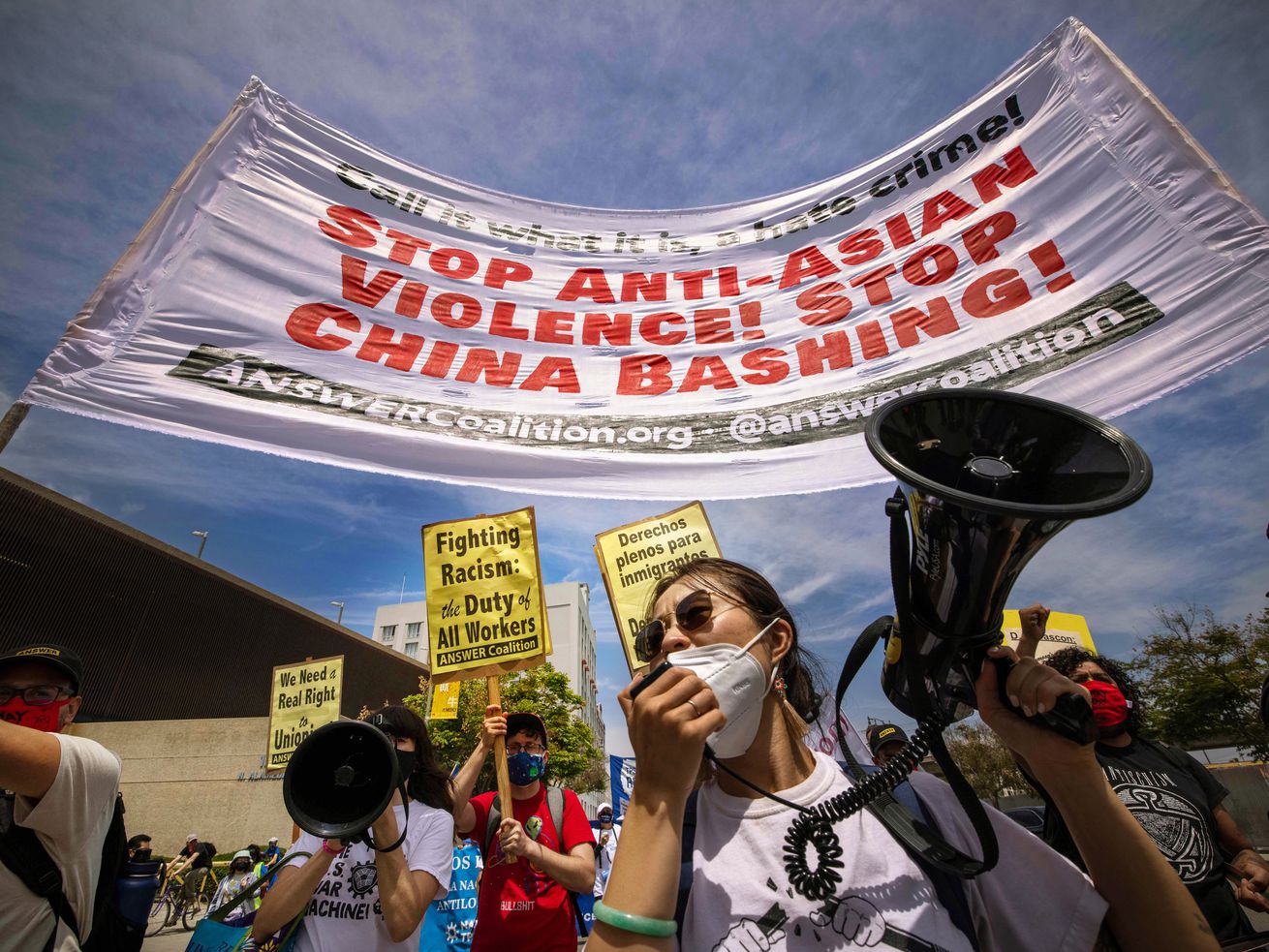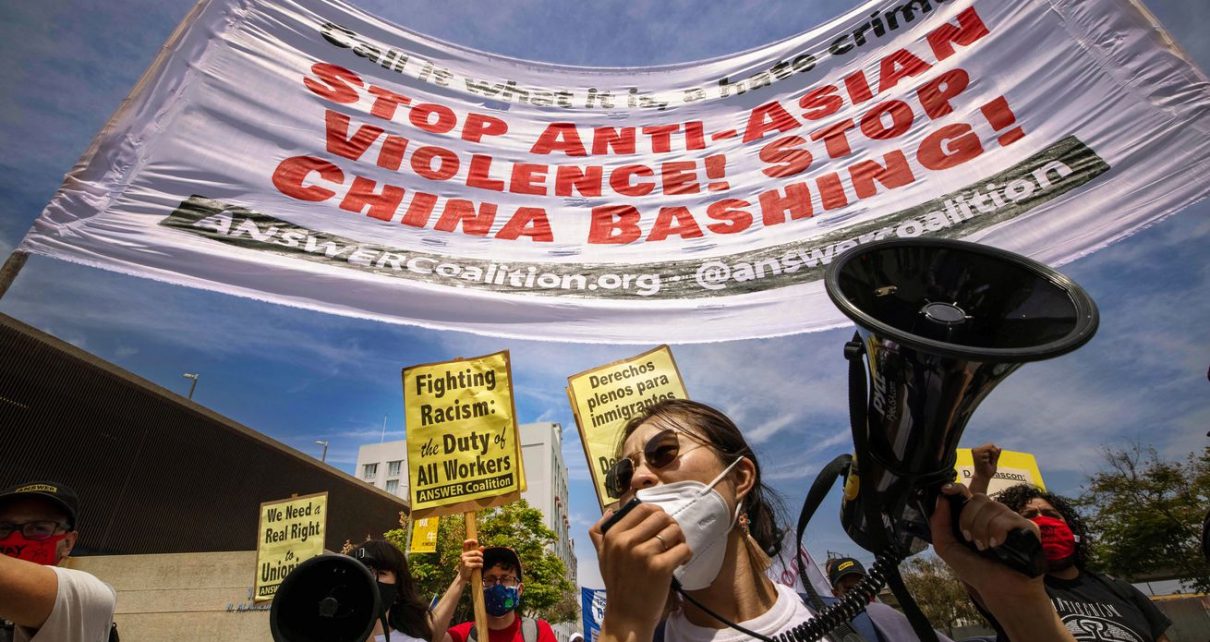
“We become collateral damage every time there’s US-Asia conflict.”
Congress is currently weighing bills aimed at bolstering US tech and science resources to counter investments the Chinese government is making in both areas.
These bills would pour billions into research and development in the coming years, while also pushing for more accountability on human rights abuses in China. They haven’t passed both chambers yet, but they’re expected to in the coming months — and they’re indicative of a renewed focus in Congress on confronting the Chinese government more directly.
Countering the Chinese government’s economic, scientific, and technological inroads has long been a focus of both political parties. But the way lawmakers have framed the importance of checking the Chinese government — from proposing sweeping legislation aimed at blocking Chinese students from studying STEM fields in the US to remarks casting the country as an “existential threat” to America — has raised concerns from activists and foreign policy experts who worry that the rhetoric and tone of such efforts will further stoke already high anti-Asian sentiment.
While there’s overwhelming agreement that a more robust focus on American scientific and technological development is needed to ensure a strong economic future for the US — and that it’s vital to hold the Chinese government accountable, especially on human rights issues like the mass internment of the Uyghur minority — lawmakers need to be extremely careful when talking about competition with China so that they don’t fuel xenophobia.
Such xenophobia, stoked in part by the anti-China rhetoric of former President Donald Trump and GOP lawmakers at the beginning of the pandemic, has already caused a lot of harm. For example, Trump’s repeated decision to use terms such as the “China virus” has been linked to increasing anti-Asian sentiment over the last year.
Since spring 2020, the organization Stop AAPI Hate has received more than 6,600 reports of anti-Asian incidents ranging from verbal abuse to physical attacks, according to its website. The spike once again makes clear how tension between the US government and Asian countries can lead to hostility toward Asian American people. That trend was apparent in past conflicts as well, including when Chinatowns were attacked during the Korean War in the 1950s and when Japanese Americans were forced into internment camps during World War II solely on the basis of their ethnicity.
“Anti-China rhetoric reinforces yellow peril fears of Asians in the US and results in exclusionary policies and racial attacks,” said Russell Jeung, a professor of Asian American studies at San Francisco State University. “Orientalist perspective, the east is foreign, difficult, dangerous — that shapes both our foreign policy and shapes how we are treated domestically.”
/cdn.vox-cdn.com/uploads/chorus_asset/file/22720281/GettyImages_1310799203t.jpg) Spencer Platt/Getty Images
Spencer Platt/Getty ImagesGiven the circumstances, it’s important for lawmakers to call out the Chinese government and bolster US resources while being sensitive to concerns about fueling racist sentiment. US attempts to spur growth should not hurt Asian American people in the process.
“It’s a fine balance that you have to play in both holding China and its policies accountable and not vilifying the people, and also be concerned about US-China relations and domestic race relations,” Jeung said.
Democrats and Republicans are both focused on “competition with China”
Addressing competition with the Chinese government is among the few areas that has garnered bipartisan consensus in recent months.
This past spring, the Innovation and Competition Act — one of Senate Majority Leader Chuck Schumer’s top priorities — overwhelmingly passed the Senate and was praised by President Joe Biden, who touted the “generational investments” it made.
The measure focuses on how the US can maintain a competitive edge in general, while citing the importance of countering the technological progress and rise of China in particular. It contains more than $200 billion in funding, including money for research and development in areas such as artificial intelligence, semiconductors, and robotics.
While the focus on research and development isn’t troubling in itself, the repeated framing of pro-innovation measures like this as “anti-China” bills has prompted concerns — including among some Asian American lawmakers — that such rhetoric taps into the same xenophobia that phrases like “China virus” previously did.
“[Lawmakers] calling it the China Bill is disturbing to me,” said Rep. Judy Chu (D-CA), the head of the Congressional Asian Pacific American Caucus (CAPAC). “That to me is Cold War rhetoric … and it is portraying China as the sole and key enemy.”
Both parties’ sweeping remarks about the legislation risk amplifying existing anti-Asian sentiments.
“If [Biden] decides to step up — he and his administration — and is really hard on China moving forward, I look forward to working with him on making sure that we out-innovate, out-compete and out-grow the Chinese and also starve them of the capital that they need to continue to build their slaveholder state and their blue-water navy,” Sen. Todd Young (R-IN) has previously said. “I have watched China take advantage of us in ways legal and illegal over the years,” Schumer (D-NY) said in a Washington Post interview about the Innovation and Competition Act.
Such statements echo a longstanding trend of how lawmakers have spoken about China in the past. Often, the threat facing the US is described as “China” or “the Chinese,” in an extremely broad sense, conflating the Chinese government with the Chinese people. Such rhetoric makes it seem like all Chinese people — and sometimes even members of the diaspora — should be considered threats to Americans, rather than the Chinese government.
As a report by Justice is Global, a project by the advocacy group People’s Action, detailed, some of the narratives used to frame critiques of the China government can rapidly translate to anti-Asian sentiment domestically. Inflammatory comments about China as an economic threat, for instance, can spur anti-Asian sentiments that blame Asian Americans for an individual’s loss of employment.
Congressional bills are only the latest measures to prompt scrutiny.
“When you see China, these are fierce people in terms of negotiation. They want to take your throat out, they want to cut you apart,” Trump previously said on Good Morning America in 2015. Biden, too, has been criticized in the past for describing Trump as someone who “rolled over for the Chinese,” in a campaign ad. Activists have also flagged prior comments made by FBI Director Christopher Wray, who has said that the challenges posed by China are a “whole of society” problem, a statement that seemed to imply that Chinese people overall were broadly to blame for national security threats.
Wow @JoeBiden. Already trying to out-Trump Trump. This kind of fearmongering is causing violent attacks on Asian Americans. If you are trying to reform your past history of racist policymaking, like your 1994 crime bill, you had better do some homework. This ain’t it. pic.twitter.com/ePHiVGQFf3
— Cecillia Wang 王德棻 (@WangCecillia) April 19, 2020
“If we constantly evoke ‘China’ instead of specific parties, issues, or actions, then we are setting up a monolithic enemy,” said Aryani Ong, co-founder of the Asian American Federal Employees for Nondiscrimination. “What I’m concerned about is the harm to Asian Americans who are swept up by a negative public reaction to anything related to China. We saw this play out during Covid with the spike in hate and violence toward Asian Americans.”
In government and in the press, leaders’ policies are sometimes referred to by the country they represent. But in the case of China, there is a history of violence and disenfranchisement against Asian Americans and Asian immigrants, and the known pattern of associating US-Asia conflict with Asian Americans. Because of the pervasiveness of the “forever foreigner” stereotype — the idea that the loyalties of all Asian people in the US lie elsewhere — anti-China sentiment can very quickly spur xenophobia domestically.
In guidance that the Congressional Asian Pacific American Caucus has released to lawmakers regarding the rhetoric about bills addressing competition, the group pointed this problem out explicitly. “While it is common to refer to the actions of a government by the name of the country, in the context of rising anti-Asian hate, doing so can stoke xenophobia and hate,” they write. “This can be construed as implying that the Chinese people and Chinese Americans are enemies of the United States who seek to harm us.” To avoid this, CAPAC recommends specificity: for example, using terms like “Chinese government,” or “Beijing,” in lieu of “China.”
Michael Swaine, the director of the East Asia program at the think tank the Quincy Institute, says it’s an issue experts in the field have been discussing. He adds that he’s been concerned about how often lawmakers use phrases including “existential threat” as broad descriptors for China, which can set up an “us versus them” mentality.
“Quite a few China specialists are concerned about it,” he told Vox. “They see the incidents of anti-Asian attacks and that sort of thing in the US as being stimulated or triggered by certain things being said by US officials.”
Beyond being potentially dangerous, it seems that this broad rhetoric is just unnecessary. As Vox’s Jerusalem Demsas has previously reported, such framing isn’t needed to garner public support for policies like the Innovation and Competition Act. As Demsas noted, portraying the legislation as investments to compete with China did little to change how much the public ultimately backed it in a survey fielded by Data for Progress earlier this year.
Conflict or competition with Asian countries has historically fueled xenophobia
Historically, there have been numerous instances of either conflict or competition with Asian countries spurring xenophobia or anti-Asian sentiment in the US.
In 1982, as manufacturing competition with Japan ramped up, two Detroit autoworkers beat and killed 27-year-old draftsman Vincent Chin, a Chinese American man, accusing him of taking their jobs. During the Korean War, when China aligned itself with North Korea, vandals went after businesses near Chinatowns across the US. During World War II, in the wake of Japan’s attack on Pearl Harbor, Japanese Americans were put into internment camps by the US government. And following the September 11 terrorist attacks, South Asian Americans were among those targeted for the way they looked.
Most recently, during the pandemic, there’s been a sharp uptick of reported anti-Asian incidents tied to rhetoric used by President Trump and other Republicans who deployed phrases like “China virus,” and “Kung Flu,” which effectively scapegoated Asian Americans for the spread of the coronavirus.
“When officials express fears over China or other Asian countries, Americans immediately turn to a timeworn racial script that questions the loyalty, allegiance and belonging of 20 million Asian Americans,” University of Maryland political science professor Janelle Wong and writer Viet Thanh Nguyen previously argued in a Washington Post op-ed. “Most Americans are not skilled at distinguishing between people of different Asian origins or ancestries, and the result is that whenever China is attacked, so are Asian Americans as a whole.”
This conflation is a direct result of the belief that Asian Americans are perpetual foreigners, and feeds off tropes that treat all Asian people as homogenous.
“We become collateral damage every time there’s US-Asia conflict,” said Ong.
Concerns about such profiling have emerged following accusations faced by Chinese American scientists in recent decades as STEM competition between the two countries has grown. In 1999, Chinese American scientist Wen Ho Lee was arrested by the US government, only to be released once he pleaded guilty to mishandling data, and it became clear there was not sufficient evidence to support other allegations. In 2014, hydrologist Sherry Chen was apprehended for similar reasons and also saw the charges subsequently dropped. It’s a reminder that it isn’t just individual citizens, but the US government itself that still makes negative assumptions about many people of Asian descent.
“Our country … has a long and sordid history of discrimination against Chinese Americans, of targeting Chinese Americans, and this dates back to the late 19th century, when there were multiple massacres of Chinese Americans and multiple discriminatory anti-immigration laws passed that targeted the Chinese community,” Rep. Jamie Raskin (D-MD) said at a recent roundtable reviewing the pattern of anti-Asian discrimination. “The legacy of that history is still alive today and the latest chapter is unfortunately in the alleged targeting and scrutiny of Chinese American scientists.”
Lawmakers — and many other Americans — should reframe how they talk about China
As both recent and more distant history has made evident, the ways that lawmakers talk about China has huge effects. Broadly labeling China an enemy can lead to needless marginalization, violence, and even death.
“I think the biggest advice is to not have anything that was sweeping. We’re asking folks to watch their tone, tenor, and nuance in their approach to China,” said former chief of staff for the NextGen foreign policy initiative Caroline Chang. Staying away from broad terms and talking about the government or specific leaders, such as President Xi Jinping, is a start.
/cdn.vox-cdn.com/uploads/chorus_asset/file/22726316/GettyImages_1232966672_copy.jpg) Samuel Corum/Bloomberg via Getty Images
Samuel Corum/Bloomberg via Getty ImagesThe CAPAC promotes this idea of precision in its guidelines.
/cdn.vox-cdn.com/uploads/chorus_asset/file/22735493/Screen_Shot_2021_07_23_at_10.07.47_AM.png) Congressional Asian Pacific American Caucus
Congressional Asian Pacific American CaucusA source familiar with Schumer’s office said staffers have been careful about the rhetoric used around this bill and have been focused on flagging anything that raises concerns in drafts of news releases and speeches. The office has also been working to encourage reporters and media not to call the legislation the “China bill.”
Some activists and progressive lawmakers, including Sen. Bernie Sanders (I-VT), have also noted that the larger framing of America’s relationship as part of a zero-sum competition with China creates a stark and troubling binary that doesn’t reflect the cooperation that’s currently needed to address climate change and other pressing global problems.
“If the U.S. government doesn’t change course quickly, this dangerous bipartisan push for a new Cold War with China risks empowering hardliners in both countries, fueling more violence against Asian American and Pacific Islander communities, and failing to confront the truly existential shared threats we face this century,” a group of activists wrote in a letter this past spring.
Whether lawmakers adopt CAPAC’s recommendations — and change their approach to describing competition with the Chinese government — remains to be seen, but confronting this problem as these bills make their way through Congress will be extremely important to ensure that US leaders aren’t continuing to feed xenophobia.
“I continue to be nervous because it’s going to continue to be a challenge for the US, and we as a country need to figure out a way to talk about China,” Chang said.





